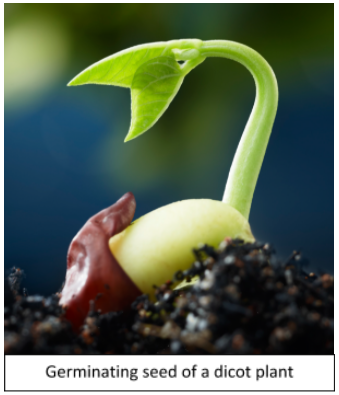
The plants whose seeds have two cotyledons are called
A. Monocots
B. Dicots
C. Biennials
D. Annuals
Answer
589.8k+ views
Hint: The prefixes ‘mono’ and ‘di’ refer to the numbers one and two respectively. If two fresh leaves appear in a germinating seed of a dicot plant.
Complete answer: Cotyledons are the embryonic leaves in seed-bearing plants. These are the first leaves that appear from a germinating seed.
The seed-bearing or flowering plants can be classified based on various characteristics.
Their classification may be based upon the following:
1) cotyledon structure,
2) flower and vascular tissue arrangement, and
3) pollen grains.
If a single cotyledon appears in a germinating seed, the plant is said to be monocot or monocotyledonous. In these plants, the veins run parallel to the length of leaves, and the flowers are arranged in three-six fold symmetry.
If two cotyledons appear in a germinating seed, the plant is said to be dicot or dicotyledonous.
These plants have a whorl like a flower arrangement and their leaves have networks of veins.

So, the correct answer is B. Dicots.
Note: Biennial refers to the type of plants that complete their life cycle within two growing seasons. Annuals refer to the plants which have a complete life cycle.
Complete answer: Cotyledons are the embryonic leaves in seed-bearing plants. These are the first leaves that appear from a germinating seed.
The seed-bearing or flowering plants can be classified based on various characteristics.
Their classification may be based upon the following:
1) cotyledon structure,
2) flower and vascular tissue arrangement, and
3) pollen grains.
If a single cotyledon appears in a germinating seed, the plant is said to be monocot or monocotyledonous. In these plants, the veins run parallel to the length of leaves, and the flowers are arranged in three-six fold symmetry.
If two cotyledons appear in a germinating seed, the plant is said to be dicot or dicotyledonous.
These plants have a whorl like a flower arrangement and their leaves have networks of veins.

So, the correct answer is B. Dicots.
Note: Biennial refers to the type of plants that complete their life cycle within two growing seasons. Annuals refer to the plants which have a complete life cycle.
Recently Updated Pages
Master Class 12 Economics: Engaging Questions & Answers for Success

Master Class 12 Physics: Engaging Questions & Answers for Success

Master Class 12 English: Engaging Questions & Answers for Success

Master Class 12 Social Science: Engaging Questions & Answers for Success

Master Class 12 Maths: Engaging Questions & Answers for Success

Master Class 12 Business Studies: Engaging Questions & Answers for Success

Trending doubts
Which are the Top 10 Largest Countries of the World?

What are the major means of transport Explain each class 12 social science CBSE

Draw a labelled sketch of the human eye class 12 physics CBSE

Why cannot DNA pass through cell membranes class 12 biology CBSE

Differentiate between insitu conservation and exsitu class 12 biology CBSE

Draw a neat and well labeled diagram of TS of ovary class 12 biology CBSE




